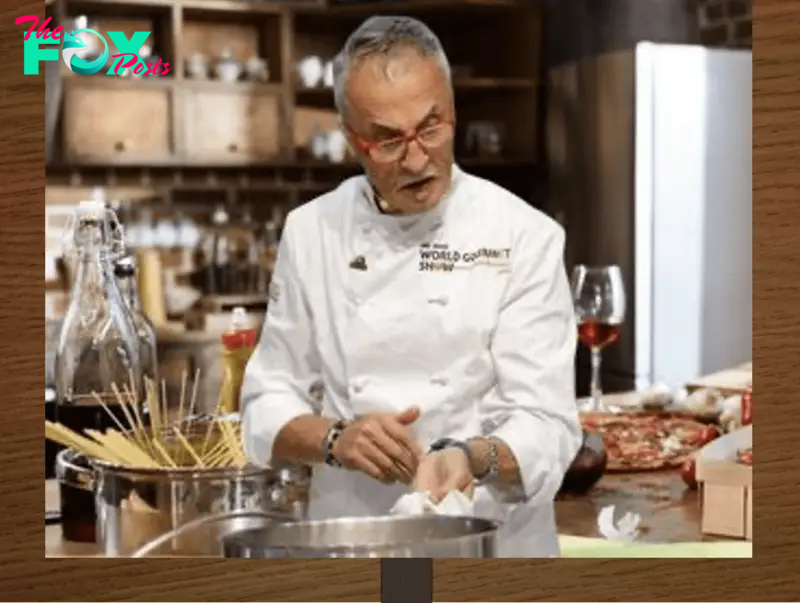Lifestyle
Ask Chef Walter: Pickling eggplant – Walter Potenza
by Executive Chef Walter Potenza, contributing writer

Friends:
A tradition of preservation for the winter months, adds techniques, flavors and innovation. Whether you’re new to pickling or continuing a family tradition, this technique is a unique gift.
Preserving vegetables, particularly eggplant, for the winter is a time-honored tradition in many cultures, particularly in Mediterranean and Eastern European regions. Pickling and preserving vegetables in oil or vinegar is rooted in necessity and culinary enjoyment. Before the age of refrigeration, families relied on methods like these to ensure a supply of food during the colder months. This tradition, deeply ingrained in our cultural heritage, has evolved into an art form, passed down through generations, preserving not only the vegetables but also a way of life.
The History of food preservation dates back thousands of years. Pickling—using salt, vinegar, or brine to preserve food—was one of the earliest methods of extending the shelf life of perishable items. This practice is believed to have originated in Mesopotamia around 2400 BCE. The ancient Romans and Greeks were also known to preserve vegetables in olive oil and vinegar, a practice that spread throughout Europe and beyond.
In Italy, where eggplant is a staple in many regional dishes, preserving it for winter became particularly important. In peak season, during the warmer months, eggplants are stored well only if preserved. Pickling it in vinegar or oil preserves the vegetable. It enhances its flavor, making it a delightful addition to winter meals.
What is eggplant botanically?
Botanically, eggplant (Solanum melongena) is a fruit, specifically a berry, that belongs to the nightshade family (Solanaceae), which also includes tomatoes, potatoes, and peppers. It is native to the Indian subcontinent and has been cultivated for centuries in various parts of Asia and the Mediterranean. The plant grows as a perennial in tropical climates and as an annual in temperate zones, producing large, glossy fruits in shades of purple, white, or green. Despite its culinary use as a vegetable, eggplant contains seeds and develops from the flowering ovary, classifying it as a botanical fruit.
How to Pickle Eggplant (lesson)
Ingredients:
- Three large eggplants
- 3 cups white vinegar
- 1 cup water
- Salt (coarse or kosher)
- Olive oil (enough to cover the eggplant)
- Five cloves garlic, sliced
- 2-3 dried chili peppers (optional)
- Fresh herbs like oregano, thyme, or rosemary
Method:
- Prepare the Eggplant: Peel the eggplants and slice them into strips or rounds, depending on your preference. Sprinkle them generously with sea or kosher salt and let them sit in a colander for a few hours or overnight to draw out excess moisture. Eggplants loaded with extra seeds will be much more bitter.
- Boil in Vinegar and Water: Rinse the salted eggplant and pat it dry. In a large pot, bring the vinegar and water to a boil. Add the eggplant slices and boil for 3-5 minutes, until they soften slightly but remain firm.
- Drying: Drain the eggplant slices and spread them on a clean cloth or paper towel. Let them dry for several hours or overnight.
- Layering and Flavoring: Once the eggplant is dry, layer it in sterilized glass jars with garlic slices, dried chili peppers, and fresh herbs. Pour olive oil over the layers, ensuring the eggplant is completely submerged.
- Storage: Seal the jars tightly and store them in a cool, dark place. After a week or two, the eggplant will be infused with garlic, herbs, and oil flavors, making it ready to enjoy throughout winter.
Benefits of Preserving Vegetables in Oil and Vinegar
- Nutrient Retention: Preserving vegetables in vinegar or oil helps retain most nutrients. Vinegar acts as an antimicrobial agent, while oil creates an oxygen-free environment that protects the food from spoilage. Eggplants are rich in fiber, vitamins, and antioxidants, and pickling helps preserve these beneficial compounds.
- You can enjoy the produce well beyond its seasonal availability by pickling eggplant, allowing for a more varied winter diet. This practical preservation method empowers you to make the most of seasonal abundance and extend the enjoyment of your favorite vegetables. Whether you’re a fan of the tangy bite of vinegar or the smooth richness of olive oil, pickling in these mediums enhances the natural flavors of the eggplant. Adding herbs, garlic, and spices creates a more complex and layered taste profile, offering endless culinary versatility and a chance to get creative in the kitchen. Culinary Tradition and Heritage: Preserving vegetables connects us to a time-honored tradition, often tied to cultural rituals and family gatherings. In many Italian households, pickling is still an essential part of the fall harvest, where families come together to prepare food for the winter months.
Final thoughts!
Preserving eggplant or any vegetable is more than just a practical way to store food—it’s a way to celebrate seasonal abundance, culinary heritage, and the art of extending flavors from one season into another. Whether you’re new to pickling or continuing a family tradition, this technique is a beautiful way to enhance your pantry and table.

www.chefwalterscookingschool.com
www.chefwaltersfoodtours.com
Emilia Romagna, May 12 – 19, 2025, Chef Walters Food + Wine + History + Culture Tour

___

Meet Chef Walter!
There is a constant, recognizable thread in the career of Walter Potenza to elevate the level of Italian culinary culture in the United States. Besides his unquestionable culinary talent and winning Business perspective, Chef Walter has been a relentless educator with passion and knowledge who defeats stereotypes. His life, career, and values are a model, an example to follow by any chef of Italian gAstronomy working outside Italy.
Chef Walter appears regularly on National and International Networks such as Food Network, ABC, CBS, NBC, RAI, FOX, and Publications such as NY. Times, Washington Post, Wall Street Journal, Food & Wine, Saveur, Gourmet, and several Italian media outlets. And now – RINewsToday!
www.chefwalterscookingschool.com
-

 Lifestyle2h ago
Lifestyle2h agoFrieze Masters Seoul 2024: Simply Irresistible
-

 Lifestyle3h ago
Lifestyle3h agoChristopher Reeve’s son lost both his parents by age 13
-

 Lifestyle3h ago
Lifestyle3h agoMy Girlfriend Left My Dog at the Shelter While I Was at Work, When I Went to Take Him Home, He Was Gone
-

 Lifestyle3h ago
Lifestyle3h agoDesiree Anzalone, great-granddaughter of Desi Arnaz and Lucille Ball, and her tragic fate
-

 Lifestyle3h ago
Lifestyle3h agoI ruined my son’s wedding and don’t regret it! Am I wrong for doing it?
-

 Lifestyle3h ago
Lifestyle3h agoNurturing Pure Innocence: Embracing the Joys of Parenthood.sena
-

 Lifestyle4h ago
Lifestyle4h agoSinger SSanam Marvi announces third marriage, opens up about past relationships
-

 Lifestyle8h ago
Lifestyle8h agoRadiance at the Palace Pool: A Day with Angelina Jolie



























